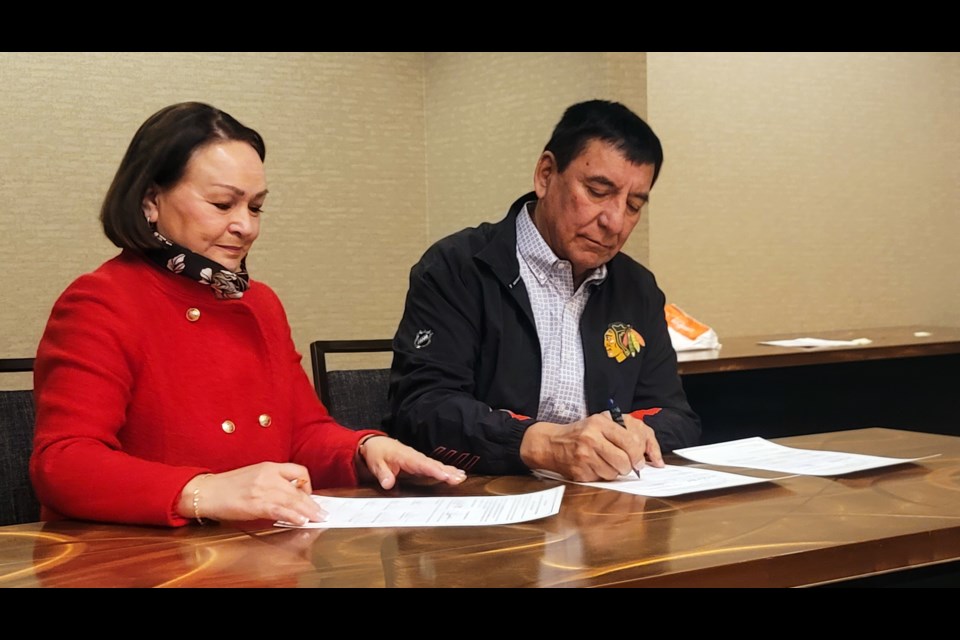A historic economic development agreement between the Ulkatcho First Nation and the McLeod Lake Indian Band, along with five resource-based companies, has created a partnership that paves the way for future development.
The formal agreement was signed Thursday afternoon at a downtown Prince George hotel and it brings together two Indigenous nations who share common goals of creating jobs and prosperity for their people through development of natural resource projects.
McLeod Lake Indian Band Chief Harley Chingee says the partnership between McLeod Lake’s Duz Cho Group of Companies and the Ulkatcho Group of Companies paves the way for the sharing of Duz Cho’s expertise and experience in foresty, construction and mining. It will bring that to the Ulkatcho territory in the Cariboo-Chilcotin between Williams Lake and Bella Coola to allow the people there to participate in major projects such the New Gold mine 80 kilometres south of Vanderhoof.
“They want to seize opportunities that New Gold mine is bringing into their territory so we’re going to help them with capacity and supply equipment and resources, labour and administrative help,” said Chingee.
“We build roads and do a lot of earthworks and these other companies bring other forms of business to so we should all work together and make it happen. The speed of business moves fast and I think that Ulkatcho sees that as one of the ways they can benefit the nation, doing business with other nations that do have the capacity.”
Ulkatcho First Nation Chief Lynda Price sees the partnership and the development it will bring as a way to generate wealth to pay for public works infrastructure, housing and it will create jobs that will lead to prosperity for her people.
“Many of our communities are at different levels of development and I believe that Duz Cho and their company have a very significant role to play in development of our first nation community to support some of the initiatives and work our UFN corporate directors are looking at for the future,” said Price.
“We look forward to the development of many projects in the northern part of our ancestral lands and know in the future there will be more opportunity for us to work together, especially with some of the initiatives going on with the Artemis Blackwater gold mine. There will be job opportunities as well as building capacity of our first nation, which is critical during these times.
The agreement creates limited partnership for the five companies – Duz Cho Group, DWB Consulting, Omineca Aggregates, Draganfly Inc., and Kode Contracting -- to join with the Ulkatcho Group of Companies.
“It gives the nation the opportunity have the professional and physical resources to do the projects associated with their territory and it allows the development and training of people for those projects and it allows the nation to take advantage of some of those economic opportunities within their territory,” said Kevin Bradford, CEO of DWB Consulting, which provides environmental services such as wildlife management, water management, forestry and structural engineering services.
“We’ve worked with Ulkatcho now for more than 30 years so in a lot of ways this is a formalization of a partnership we’ve already had with the nation for a long time.”
Initial talks to create the partnership, the first of its kind between two first nations, began three years ago.
“This is symbolic of nations coming together to pursue economic development jointly as opposed to being on opposite ends,” “These are meaningful partnerships between people who are like-minded, as opposed to a transactional relationship, and we’re in this for the longterm.
“It’s time to recognize in Canada that first nations, as traditional landowners in many jurisdictions, have a right to be at the table, and it is through such public-private community partnerships that we can start developing those meaningful relationships and we can expand to multi-inputs area development,” said Al Jamal, chair of the Ulkatcho Group.
“Not just housing, not just education, in silos, because the needs of the community are not singular they are multi-fold and unless industry and government come together in partnership with the communities we will always find the levels of poverty that we sometimes find in many of these communities.”



